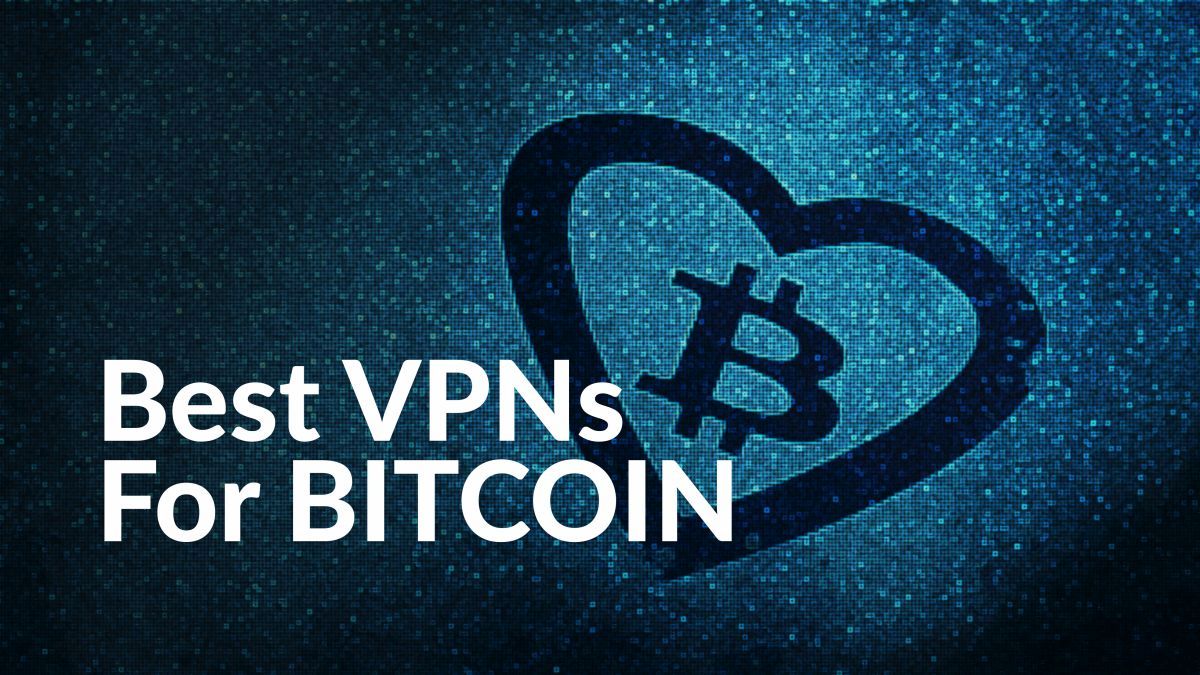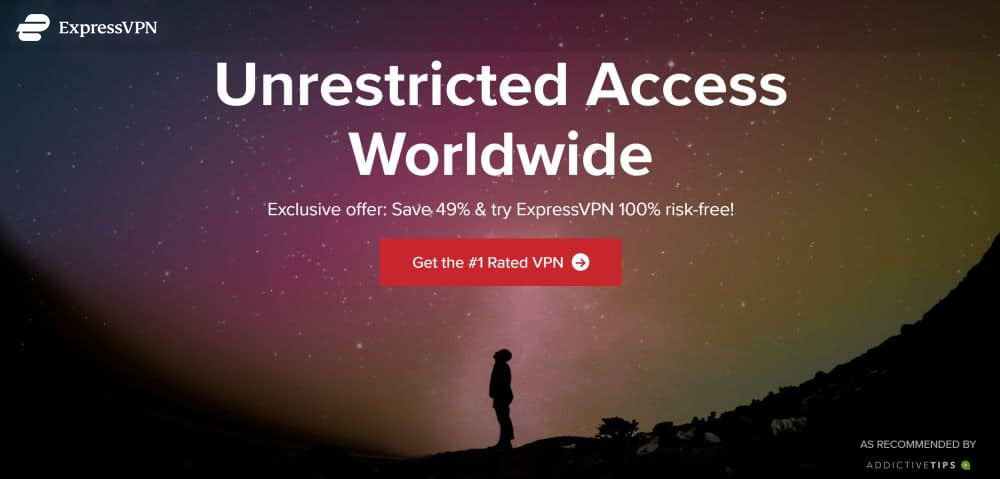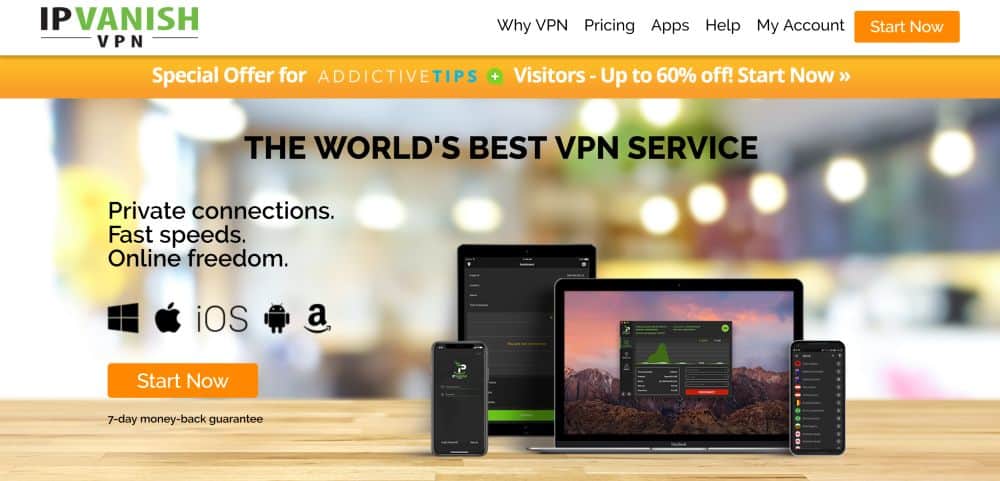Best Bitcoin VPN Clients in 2025
If you’re searching for the best VPN that accepts Bitcoin transactions, you’ve landed on the right page. Today, we’ll show you the risks involved with Bitcoin, and how a VPN shores up those deficiencies. We’ll also recommend the top VPN providers guaranteed to enhance your privacy online which also accept cryptocurrency for total anonymity.

When researching the best VPNs on the market, privacy and security are most people’s top concerns. A virtual private network helps restore these by encrypting data that leaves the device, preventing third parties, ISPs, and government agencies from stealing, tracking, or recording online activity. With a VPN in place you can browse the internet without worrying about someone watching your every move.
These VPNs accept Bitcoin, allowing you to completely divorce your identity from your traffic:
- NordVPN – Best for Cryptocurrencies – Not only does NordVPN accept Bitcoin, they also offer the strongest privacy provisions you need to secure your crypto wallet and make safe transactions online.
- Surfshark – Highly affordable, but full-featured provider that allows for truly anonymous usage of their service.
- ExpressVPN – Whether you’re sniping a bid or just trying to watch some Netflix, you want the fastest VPN available.
- PureVPN – One of the best choices for connecting to servers in some truly obscure locations.
- IPVanish – A well-regarded VPN with a good balance of speed and security.
Simply installing a VPN isn’t the most you can do to protect your online privacy, however. When you pay for a VPN you’ll likely use a credit card, which is directly associated with your name and home address. This means activity that passes through the VPN can theoretically lead back to you, no matter how heavily it’s encrypted. This is worrisome for many VPN users, but there are steps you can take to keep the transaction private, including buying VPN service using cryptocurrencies such as bitcoin.
Why pay for a VPN with Bitcoin?
When privacy is extremely important, paying with bitcoins is the way to go. Most other online payment methods leave an easy to recognize trail anyone can follow. If you make a purchase with a credit card or PayPal, for example, your name and address are readily associated with that transaction. This can be a major drawback to buying VPN service, as part of the reason you’re signing up is to boost your online privacy.
VPNs keep their users relatively anonymous by providing high levels of encryption for all their data. Information you send that passes through a VPN’s servers is scrambled, and the VPN shouldn’t keep logs of those transactions. If you’re trying to remain as anonymous as possible, however, a third party could theoretically track your activity by matching VPN IP addresses with VPN providers, then sifting through payment databases to discover the record of your purchase, name and address attached.
RELATED READING: How to get a unique VPN IP address
Bitcoin payments keeps the entire transaction more secure. Instead of signing off with your PayPal or bank account, bitcoins let you send money without leaving a trail. Your bitcoin wallet doesn’t contain your name, just details about how to verify the payment and extract funds. You’ll get your VPN service and your details won’t be associated with the account. When privacy is a must, paying with bitcoin is essential.
More and more online vendors are accepting bitcoin as payment. Even physical retail stores have begun to embrace the modern cryptocurrency movement. Companies that run virtual private networks know their customers are interested in strong online security, which is why many of them let you buy service and renew subscriptions using bitcoins. The prices are the same, the process is the same, only instead of handing over your name and address through a credit card transaction, you get to utilize the blockchain for a safe and anonymous transaction.
What makes a great VPN?
Since privacy is the top concern with VPNs that accept bitcoins, we focused our research on the best providers with the strongest privacy policies. You don’t need to get into the details about precise encryption protocols or server network distributions. Just use the criteria below when searching for the best bitcoin VPN and you’ll be well on your way to preserving your online privacy.
- Logging policy – A VPN’s logging policy is the backbone of your privacy. Data that passes through VPN servers can be stored just like with an ISP. If a government agency requests access to these logs, your personal data could be compromised. If the VPN doesn’t keep logs, however, your data can’t be shared. It’s a simple but effective way to secure information, as the VPN can’t share something that doesn’t exist. Always make sure your chosen VPN has a strict zero-logging policy, no exceptions.
- Jurisdiction – An often overlooked feature of VPN service is where the company is registered. Some countries can require VPN provider to keep logs of certain information, things like time stamps or detailed traffic reports. This overrides the VPN’s policy on keeping logs, and it makes it both possible and completely legal for third parties to obtain copies of these logs. It’s always best to choose a VPN based in a country with privacy-friendly laws, and which don’t participate in international surveillance operations.
- Traffic restrictions – Some VPNs impose limits on how much and which types of traffic its users can consume. Bandwidth caps are surprisingly common, for example, as are filters that block peer-to-peer networks and torrent traffic. To make sure you have unrestricted access to the internet, check your VPN’s policy on allowed file types before signing up.
- Speed – VPNs tend to be slower than standard internet connections, all thanks to encryption and worldwide server locations. To help offset this inevitable drop in speed, good VPNs will configure their hardware and software for the best performance.
Best VPNs that accept Bitcoin payments
Keeping the above criteria in mind, we scoured the market for the strongest providers. Below are our recommendations for the best Bitcoin VPNs:
1. NordVPN

NordVPN is a well-rounded VPN provider with fantastic privacy policies. Double encryption is the service’s signature feature. Important data that passes through select servers gets wrapped in 256-bit AES encryption, locking it so tightly that not even a supercomputer can break it. On top of this, NordVPN has one of the most thorough zero-logging policies around, covering everything from traffic to bandwidth, IP addresses, and even time stamps. Nothing you do is stored on NordVPN’s servers, ever.
NordVPN’s plans include all of the above features and more. You can pay with bitcoins as processed through BitPay, and your transaction is even covered by the company’s 30 day money back guarantee. Sign up for a full year of service and you’ll save an additional 52% off the base price!
Some of NordVPN’s best features include great device support for all major operating systems, smartphones, and tablets; a massive network with over 5,500 servers in 60 different countries; unlimited bandwidth and no restrictions on P2P or torrent traffic; legal jurisdiction in the privacy-friendly country of Panama.
Read our full NordVPN review.
- Unblocks American Netflix
- No bandwidth caps
- Torrenting is explicitly permitted
- Retains no metadata of your browsing
- 24/7 Live Chat.
- Automatic server selection can be unreliable
- Can't specify City or Province in App.
2. Surfshark

Surfshark is an extremely consumer-friendly VPN, offering all the most in-demand features at an excellent price. You can pay with Bitcoin, Etherium, and other cryptocurrencies, while using fake credentials for total anonymous usage of their network. This dovetails beautifully with their feature set, which includes unbreakable 256-AES-GCM encryption, Camouflage obfuscation, plus the special NoBorders mode for breaking through government censorship.
Surfshark maintains over 3200 servers in 65 countries, with static IPs and multi-hop connections available. The entire network exists on diskless infrastructure, which is not only low-latency and fast, but also continuously purges any trace of your user metadata. Thus, it almost goes without saying, Surfshark never keeps logs.
Other features include a kill switch, IP/DNS/WebRTC leak protection, CleanWeb anti-malware and adblocking, plus VPN split tunneling and unlimited simultaneous connections.
- Every server optimized for unblocking Netflix, BBC iPlayer, Hulu, and more
- All 800+ servers are P2P-friendly, with private DNS and obfuscation
- CleanWeb mode blocks ads and popups before they load, saving your mobile data and speeds
- Based in the British Virgin Islands, where there are no data retention laws
- 24/7 live chat ensures maximum uptime.
- Overall, not much to complain about
- Relatively young VPN still has to prove itself trustworthy over the long haul.
Read our full Surfshark review.
3. ExpressVPN

ExpressVPN is known for high speeds and excellent privacy policies, including strong encryption and zero traffic logs. The company runs a network of over 3,000 servers in 94 different countries, most of which deliver a reliable connection to cities around the world. ExpressVPN offers custom apps for Windows, Mac, Linux, Android, and iOS, and the desktop versions of the software includes kill switch and DNS leak protection features, which helps ensure your identity never leaves your device.
ExpressVPN’s plans are competitively priced and offer discounts for longer subscriptions. Bitcoin payments are processed through BitPay, making it as easy to use cryptocurrency as it is a credit card or PayPal. All of ExpressVPN plans are backed by a 30 day money back guarantee.
ExpressVPN’s best features include unlimited bandwidth and no restrictions on P2P or torrent traffic; zero traffic logs, 256-bit AES encryption, and ultra fast servers, with speed test option built into multiple versions of its software.
Read our full ExpressVPN review.
- SPECIAL OFFER: 3 months free (49% off - link below)
- Super fast servers
- Govt-level AES-256 encryption
- No logs for personal data
- 24/7 Chat Support.
- Expensive month-to-month plan.
4. PureVPN

PureVPN has some distinct privacy advantages over many popular VPNs in the market. Their entire network of 2,000+ servers in 141 different countries is self-managed, meaning outside parties never have access to their hardware or software. This adds some security to the company’s already strong zero-logging policy, 256-bit encryption, ISP packet inspection workarounds to help preserve privacy.
PureVPN supports payments with over a dozen popular cryptocurrencies, including bitcoin and litecoin. You’ll also find some of the best deals on long term VPN subscriptions, such as the excellent 73% off a two year sign-up. You can even buy plans using a variety of retail gift cards, which is another way to get a VPN without divulging your identity.
PureVPN has a number of other useful features, including the handy ability to access the VPN through browser extensions, which include adblockers and tracking blockers; compatibility with many TV box devices, gaming consoles, smart TVs, and over 50 routers; the ability to surf, stream, and use VoIP services with incredible speed and security.
Read our full PureVPN review.
5. IPVanish

IPVanish is a friendly VPN service that aims to make the internet more accessible to the world. It does this by offering straightforward apps and easy to understand privacy policies, all backed by a network of over 1,300 servers in 60 different countries. If you want to access video streams from other countries, IPVanish can help. If you need to avoid censorship filters or visit blocked websites, IPVanish can help there, too. You’ll also never have to worry about bandwidth limitations or blocked file types, either, as IPVanish doesn’t monitor traffic in any way, shape, or form.
IPVanish accepts bitcoin payments for all of its competitively priced plans. Sign up for one month, three months, or even a full year, saving up to 46% with longer subscriptions. Note that at the time of writing you can’t set automatic renewal payments with bitcoin, so each time your service is about to end, you’ll need to manually renew.
IPVanish has a great set of features, including custom software on Windows, Mac, Linux, Android, iOS, and more; secured connections with 256-bit AES encryption and zero traffic logs; anonymous torrenting and unlimited P2P usage; the ability to connect up to five devices simultaneously.
Read our full IPVanish review.
How to use Bitcoin to buy a VPN subscription
Bitcoins are unlike any currency most people are familiar with. There are no bitcoin banks, no physical pieces of currency, and no centralized authority that creates or maintains the bitcoin ecosphere. Instead, everything is verified through a distributed network of bitcoin users and miners deploying complicated cryptography. Think of it like crowdsourcing a currency, though in reality it’s far more intricate than that.
Despite the unusual structure bitcoin transactions follow a simple path. First, a payment takes place. You send bitcoins to a VPN provider to pay for a service, for example. This transaction is then broadcast to the bitcoin network. Miners, many of whom are ordinary people with ordinary computers, process this transaction to create a block. The mining computer solves a crypto puzzle and submits proof of work to the public network, linking the created block to another block to form the blockchain. Next, other miners verify the block’s integrity, and the process continues throughout the network and for each transaction. The intricate system of checks and balances keeps the integrity intact, making bitcoin a reliable and self-sustaining system anyone in the world can use.
RELATED READING: Are Cryptocurrencies Safe and Legal to Use?
Bitcoin Terminology
The field of cryptocurrencies can be incredibly dense with technical jargon. You don’t need to be a security expert to make basic sense of the bitcoin world, but it’s helpful to know some of the basics so you don’t have to switch to a dictionary every few minutes.
- Cryptocurrency – Any decentralized digital currency, including bitcoin, litecoin, dogecoin, and other alternatives.
- Blockchain – The distributed public ledger that helps verify transactions. This is bitcoin’s version of a team of accountants or a bank, and it’s what makes the system so unique and reliable.
- Exchange rate – Bitcoins have no set value. Instead, you exchange them like you would foreign currency. At any moment bitcoins are worth different amounts in your local hard currency.
- Bitcoin exchange – Not to be confused with the exchange rate, bitcoin exchange sites are companies that exist to turn your hard currency into cryptocurrency, or to switch between cryptocurrencies themselves.
- Mining – The process of verifying bitcoin transactions. Miners maintain the blockchain and receive very small bitcoin rewards in exchange for their work.
- Wallet – Stores information necessary to make bitcoin transactions. Think of it like a personal bank that only you have access to. Wallets don’t actually store bitcoins, but without a wallet you can’t make transactions.
How to Get Bitcoin
Getting your hands on some bitcoin isn’t the same as earning hard currency. You can buy bitcoin just like you buy food or clothes. You can sell them for a loss or a profit. You can even store them until a later date to see if you can net a huge gain.
The best way to get bitcoin is to sign up with a cryptocurrency exchange. Companies like Coinbase, KuCoin, Gemini, or Kraken let you create an account, attach payment methods such as credit cards or bank accounts, then buy and store bitcoin through their interface. You’ll pay a small fee for the convenience, but it’s by far the best way to start using cryptocurrencies to pay for things like VPN services.
To get your first bitcoin, we recommend using Coinbase. Sign up with an account, verify your identity, then follow their easy interface to buy your first digital currency.
How to Pay with Bitcoin
Believe it or not, paying with bitcoin is arguably easier than sending a PayPal or credit card payment. All you need is a bitcoin wallet, which you’ll have access to if you purchased bitcoin on an exchange. Go to your VPN and initiate the subscription process. Choose to pay with bitcoins. Copy your “send” wallet address and paste it into the VPN’s interface. The amount will be taken from your bitcoin storage and processed within minutes.
RELATED READING: How to Keep Your Wallet Protected
Notes about Paying with Bitcoins
Buying, selling, trading, and spending bitcoins is easy. You don’t need to be an expert on the underlying technology to successfully use cryptocurrency, but the more you know the better. A common mistake is to think of bitcoins just like any other currency. This can be true in some respects, though there are some things you should know about bitcoins before you start spending them.
Wallets can be tough to secure
In order to use bitcoins you need a bitcoin wallet. These aren’t necessarily physical structures. They can be pieces of paper, text files, images, or anything that can store a string of letters and numbers. You have a lot of control over what your bitcoins do, but it’s easy to misplace or even lose bitcoin wallets, which is the same as throwing money in the trash.
LEARN MORE: Everything you need to know about the CryptoShuffler Trojan and keeping your wallet protected
Bitcoin transactions are irreversible
There’s no way to undo or cancel a bitcoin transaction. Once you spend it, it’s gone. Transactions can be refunded if the receiving is willing to do so, but it’s not exactly the same as reversing a charge.
Bitcoin isn’t entirely anonymous
While using bitcoins is incredibly secure, the process doesn’t guarantee your anonymity. The method you use to buy bitcoins can leave a trail, as can your IP address or other online activity.
Bitcoin prices constantly change
The value of a unit of bitcoin is always fluctuating. At the time of writing a single bitcoin is worth about 2,500 USD. This means a single USD is worth 0.0004 BTC. That value will be different each day, going up or down based on a number of external factors. This can make spending bitcoins more like trading stocks.
Some fees are involved
Each transaction requires a small mining fee, which powers the bitcoin network and keeps payments reliable. These fees can vary from day to day, but on the whole they’re much less than a PayPal surcharge or ATM withdraw fee, for example.
Recurring payments aren’t available
Because wallet addresses change constantly, conveniences like recurring payments usually aren’t possible with bitcoin. Some VPNs work around this using alternative methods, but by and large you’ll have to manually pay each time your subscription renews.
Other Benefits of Using a VPN
Getting a VPN brings a lot of extra benefits you may not expect. Privacy is at the top of the list, of course, and it extends well beyond the simple “stop mass surveillance” tagline you see around the web. You’ll also get a measure of anonymity, extra online security, and even added safety when you travel. And if you buy your VPN using bitcoins, many of those anonymity bonuses are even stronger!
Below are some of the added benefits using a VPN can provide.
Watch videos from other regions – Have you ever tried to watch a movie on Netflix, Hulu, or YouTube and seen the message “Not available in your region”? Content distributors restrict which shows and movies are available in which countries. With a VPN you can instantly change your virtual location through the VPN’s software. If you need to access BBC iPlayer, for example, but you don’t live in the UK, simply open the VPN, swap servers, reload, and start streaming.
Stop surveillance and tracking – IP addresses act like a mailing address for digital information. Each request you make through the internet is sent and delivered via the same IP. Since your location and ISP account information are tied to your IP address, they can be used to associate data with your identity, undermining any hopes of privacy online. Government agencies and even service providers themselves use this fact to follow users’ internet activity on a regular basis. Thanks to VPNs and their dual abilities of encryption and non-local IPs, you can surf the internet without leaving an easy to follow trail behind.
Stay safe while traveling – When you travel you’re more vulnerable than ever. Accessing public Wi-Fi places you at risk from hackers and shady ISPs alike, and then there’s the ever present issue of losing your data to fake hotspots. By using a VPN on your Android or iOS device, you can encrypt everything for an extra layer of privacy. And don’t forget to encrypt your Android or iPhone for localized protection, too.
Access censored websites – Government and corporate censorship has become a more common problem in the modern world. It’s easy for a company to block certain websites or a country to forbid access to domains or types of content. Most of these filters work by simply comparing IP addresses and not allowing a certain range through. Since VPNs both encrypt data and assign it a new, non-local IP address, many of these censorship issues can be neatly sidestepped without much effort.
Buy with bitcoins and VPNs for extra anonymity – VPNs by themselves aren’t perfect solutions for online anonymity. Neither are bitcoin transactions. Combine the two, however, and you’ve suddenly got an amazingly private way to conducting business online.
Using a Free VPN Doesn’t Help Your Online Privacy
If paying for a VPN exposes your personal data, why not use a free VPN? It’s tempting to install one of the countless no-cost VPNs available on the market. All of them promise fast speeds and hundreds of servers to choose from. All you have to do is click and start browsing, sounds easy, right? Unfortunately, free VPNs can pose a real threat to your online privacy, all because of money.
No-cost VPNs have to bring in some form of income to keep their servers online. Since their users aren’t providing that income, they have to source it elsewhere. This usually comes in the form of selling the data they promised to keep safe. In other words, your private browsing data. Free VPNs usually have slow speeds, bandwidth limitations, and blocked protocols like P2P and torrents. And if they’re keeping logs of user activity and selling that to third parties, your privacy isn’t improving, it’s going straight down the drain.
Investing in a good paid VPN service isn’t expensive, and it’s extremely easy to pay with bitcoin for an added layer of anonymity. This small effort can help ensure your privacy stays intact online.
Is Bitcoin the Best Cryptocurrency?
Bitcoin was one of the first cryptocurrencies ever released. It gained popularity slowly, then exploded into the mainstream in the early 2010s. Countless altcoin copycats followed, some of which simply tried to emulate Bitcoin’s style and design. Others went a few steps further and introduced new features that compensated for some of Bitcoin’s shortcomings.
Bitcoin remains the most popular cryptocurrency by a large margin. For this reason, it’s usually easier to buy, sell, trade, and purchase things like VPNs with.
Ethereum is the second most popular cryptocurrency. It’s tied into the Ethereum Network, which is a complex collection of decentralized apps and smart contracts that can run everything from websites to new Bitcoin clones. Ethereum is on-par with Bitcoin’s level of privacy, though it can be a bit more secure thanks to its focus on keeping its core data secure at all costs.
Conclusion
Today, we covered the basics of Bitcoin and how to use it to subscribe to a VPN service, the risks involved in using cryptocurrencies, and how to stay safe using a VPN. We also presented five outstanding VPN providers proven to boost the security of Bitcoin transactions. Have you used any of our recommendations? How do you stay safe when using Bitcoin? Let us know your thoughts in the comments below.?
If you need a VPN for a short while when traveling for example, you can get our top ranked VPN free of charge. NordVPN includes a 30-day money-back guarantee. You will need to pay for the subscription, that’s a fact, but it allows full access for 30 days and then you cancel for a full refund. Their no-questions-asked cancellation policy lives up to its name.

Luckily today I hear that you can buy your electronics, mobile phones, computers and games from https://www.geekstore.cf they also offer free shipping and accept other cryptocurrencies
If only I had any bitcoins to protect 😀 I would probably go with Nordpvn since I use it
good job nice article